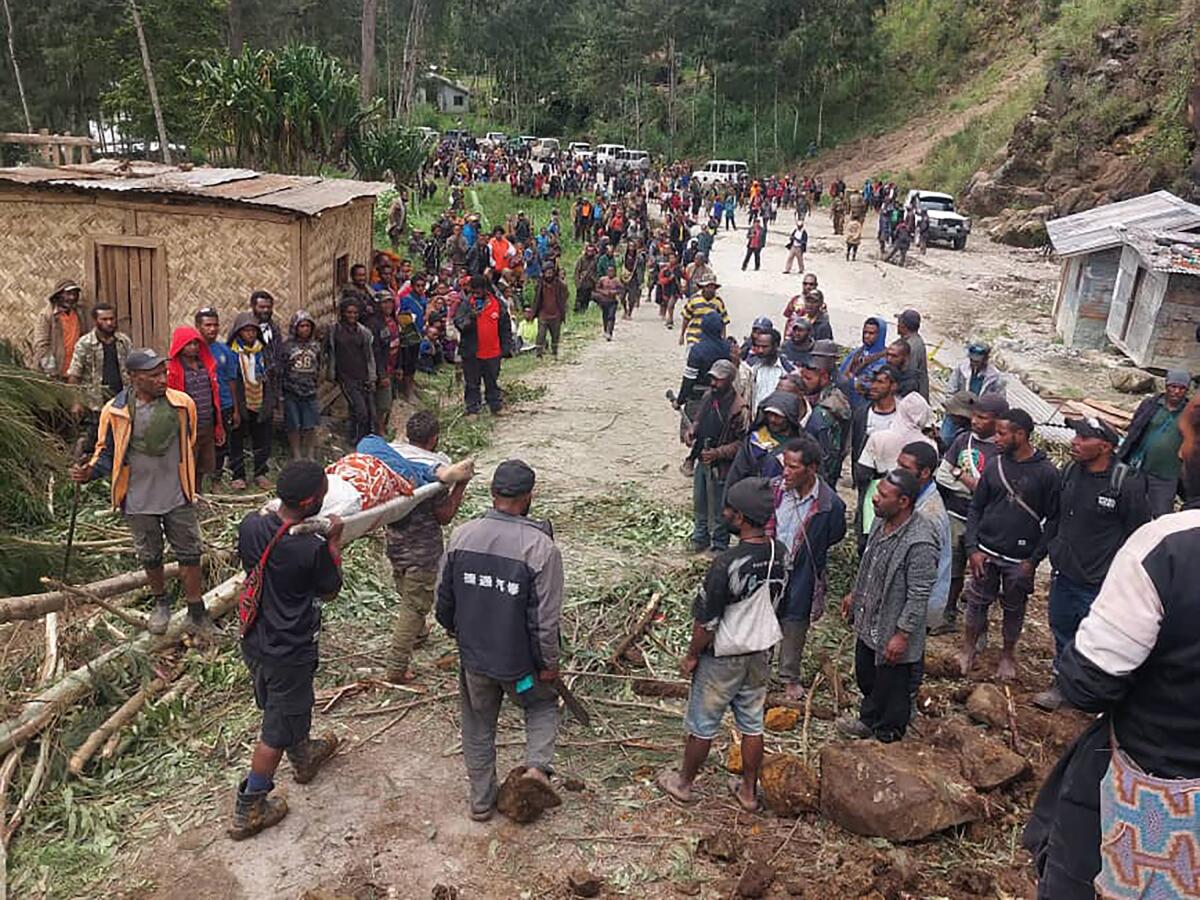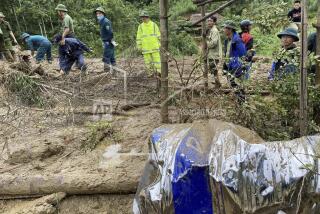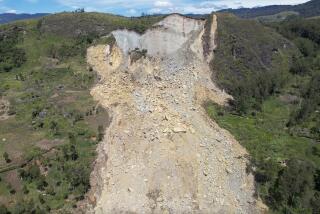100 feared dead in Papua New Guinea landslide; emergency convoy takes provisions to survivors

- Share via
MELBOURNE — Survivors searched through tons of earth and rubble by hand looking for relatives while an emergency convoy delivered aid Saturday to a remote village in the mountains of Papua New Guinea where a landslide was feared to have buried scores of people, officials said.
An assessment team reported that perhaps 100 people were dead and 60 houses buried by the mountainside that collapsed in Enga province a few hours before dawn Friday, said Serhan Aktoprak, the chief of the International Organization for Migration’s mission in the South Pacific island nation.
Confirming a firm number of those who have died will be difficult “given it is considered culturally taboo to ask survivors of the status of their relatives,” Aktoprak said.
Aktoprak said that if the number of buried houses estimated by local authorities was correct, the death toll could be higher.
Only three bodies had been recovered by early Saturday from the vast swath of earth, boulders and splintered trees that struck Yambali, a village of nearly 4,000 people that is 370 miles northwest of the capital, Port Moresby.
Medical treatment was provided to seven people, including a child, said Aktoprak, who is based in Port Moresby. He had no information about the extent of their injuries.
“It is feared that the number of casualties and wounded will increase dramatically,” he said.
A spokesperson for Papua New Guinea Prime Minister James Marape said Saturday he would release information about the scale of the destruction and loss of life when it becomes available.
Philip Mene, an International Organization for Migration program associate, said survivors “are removing the rubble by hand.”
“Relatives are coming to terms that the people below the debris are all but lost,” he said Saturday.
The gardens that sustain the village’s subsistence farming population were destroyed, and the three streams that provide drinking water were buried.
A convoy left the provincial capital of Wabag carrying food, water and other essentials to the devastated village 35 miles away, Aktoprak said.
Village resident Andrew Ruing said the survivors were in desperate need.
“People — they cannot cry or they cannot do anything, because it’s difficult for them,” Ruing said in a video shown by Australian Broadcasting Corp.
“We are calling on the national government, the people on the ground, or the business houses, the heights from everywhere, anywhere — we are seeking assistance,” he said.
Aktoprak said that besides food and water, the villagers had an urgent need for shelter and blankets. Relief would be targeted to the most vulnerable, including children, women and disabled and elderly people, he said.
The relief effort was delayed by the blockage of the province’s main highway, which serves the Porgera gold mine and the neighboring town of Porgera.
More convoys are planned for Sunday, including the arrival of heavy earth-moving machinery to help clear the 20 to 26 feet of debris, earth and rocks that fell from the Mungalo mountain above Yambali.
Emergency responders may face challenges using heavy machinery because of the risk from unstable earth as well as “cultural sensitivities of desecrating bodies that may be within the rubble,” Mene said.
Papua New Guinea is a diverse, developing nation of mostly subsistence farmers with 800 languages. There are few roads outside the larger cities.
With 10 million people, it is the most populous South Pacific nation after neighboring Australia, which is home to about 27 million.
It is on the eastern half of the island of New Guinea and sits on the Pacific “Ring of Fire,” the arc of seismic faults around the Pacific Ocean where much of the world’s earthquake and volcanic activity occurs. In March, the country was hit by a magnitude 6.9 earthquake.
The United States and Australia are building closer defense ties with the strategically important nation, with whom China is seeking closer security and economic ties.
President Biden and Australian Prime Minister Anthony Albanese said their governments stood ready to help respond to the landslide.
Biden, who was to become the first sitting U.S. president to visit Papua New Guinea a year ago but canceled the trip to focus on a debt crisis in Congress, said he was heartbroken by the loss of life and devastation.
“Our prayers are with all the families impacted by this tragedy and all the first responders who are putting themselves in harm’s way to help their fellow citizens,” Biden said in a statement.
“The United States stands with Papua New Guinea — our close partner and friend — today and always,” Biden added.
Albanese posted on the social media platform X: “All Australians grieve for our brothers and sisters in Papua New Guinea after the terrible landslide.”
McGuirk writes for the Associated Press.
More to Read
Sign up for Essential California
The most important California stories and recommendations in your inbox every morning.
You may occasionally receive promotional content from the Los Angeles Times.










